
Two Southern Arizonan nonprofit organizations, Native Seeds/SEARCH and Tohono O’odham Community Action, are working to promote wild food sources and desert tolerant crops in the region.
Before Arizona became known for its cotton and citrus, before farmers moved west to tame the land, before Spanish explorers first set their eyes on the Grand Canyon, the Tohono O’odham were cultivating the land and using the Southwest’s natural food sources to survive.
For hundreds of years, their diet consisted of wild foods straight from the Sonoran Desert like mesquite bean pods, cholla buds, and prickly pear fruit. The Tohono O’odham were also adept farmers, growing enough desert-hardy crops, like tepary beans and 60-day corn, that they were completely food self-sufficient up until the mid-20th century.
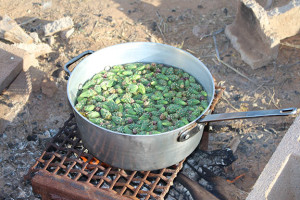
International turmoil and government programs in the mid-1900s pulled many Native Americans away from their homes and introduced processed foods to the reservations, which in turn led to the near complete disappearance of their traditional food sources.
The loss of their native foods also resulted in a startling rise of obesity, and consequently diabetes, amongst Native American tribes, including the Tohono O’odham.
According to the U.S. Department of Health and Human Services, American Indian adults are twice as likely to be diagnosed with Type 2 diabetes when compared to non-Hispanic whites.
However, the real victims are young Native Americans, specifically those between the ages of 10 and 19, who are nine times more likely to be diagnosed with the disease. From just 1990 to 2009, diabetes diagnosis’s rose 110 percent for that age group.
Recognizing the need for a positive community program in the Tohono O’odham Reservation that promoted a healthy and culturally rich lifestyle, Terrol Dew Johnson founded Tohono O’odham Community Action, or TOCA, in 1992.
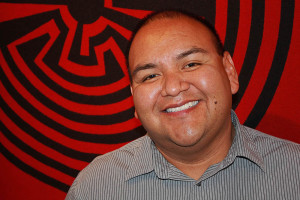
“Our whole intent was to have some kind of structured, positive program for youth and the community,” says Johnson. “I just wanted to have some sort organization that everybody could be a part of, regardless of age.”
Employing the community’s elders as teachers, TOCA began teaching anyone who was interested about the traditional O’odham food system, which includes wild plant harvesting and dry-land farming.
Initially, TOCA was more of an after school or summer program for students on the reservation. The community elders would take children out to the desert where they would teach them how to harvest wild plants, like saguaro cactus fruit and the aforementioned cholla buds.
Over the years however, Johnson’s nonprofit has rapidly grown in both popularity and size. TOCA is now a multi-faceted operation that includes the Desert Rain Café, a restaurant that specializes in native foods, Native Foodways Magazine, a magazine highlighting aspects of Native American cuisine, and various comprehensive community initiatives that seek to reclaim their Nation’s food sovereignty.
“Food sovereignty is our buzz word right now,” says Johnson. “Our goal now is to make this tribe more self-sufficient with their food.”
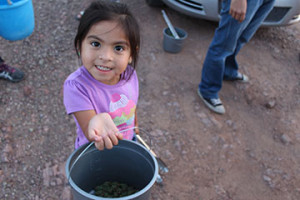
These initiatives include their “New Generation of O’odham Farmers” program, introduced in 2009, that provides young adults with the training and skills necessary to pursue a career in sustainable agriculture.
TOCA also works with teachers and students on the reservations to develop and maintain school gardens. The gardens are meant to help the children develop a work ethic and an appreciation for healthy food says Johnson, but he is also trying to make the food they grow part of the school lunch program.
TOCA isn’t alone in its quest to revitalize historic crops that thrive in this arid climate.
Native Seeds/SEARCH, a seed conservation nonprofit based in Tucson has almost 2,000 varieties adapted to dry weather, many of which came from Southwest tribes like the Tohono O’odham.
“We’re trying to take seeds that have been gathered over the years, many of which were used for centuries but are in danger of being lost, and grow them to increase their supply,” says Larrie Warren, the executive director.
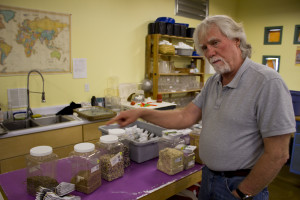
On the nonprofit’s 60-acre-farm near Patagonia, a rotating variety of plants are grown that they harvest to increase their supply of certain seeds. Some of these harvested seeds make it back to the refrigerators and freezers at their headquarters that they use to preserve much of the organization’s stock, but many of them are handed out through their free seed grant program.
Most of those distributed make their way to schools or to communities struggling with food security issues, says Warren.
While some may question why food-insecure communities would seek out rarer, less established crops as a potential food source, there are notable benefits to what Native Seeds/SEARCH provides.
“We try to promote diversity,” says Warren. “If you’re growing one crop in an area, you’re going to begin having pest problems, pollination issues and other complications.”
By growing and distributing these little known and used seeds, the organization is helping develop crop diversity and improve agricultural sustainability.
Both diversity and sustainability are important to an industry that is increasingly dominated by a standardized selection of crops, which are grown in environments molded and adapted to them instead of vice-versa.
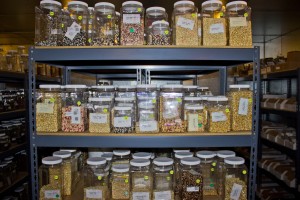
Native Seeds/SEARCH has roughly 500 varieties of corn, nearly 200 types of beans, and 1,300 other types of seeds stored in their facilities, many of which are available to the public.
All of these seeds, and those used by TOCA and the Tohono O’odham, come from desert-adapted plants that thrive with minimal water. The same cannot be said for the much of the crops that make up Arizona’s, and California’s, agricultural industries.
“Our core mission is to preserve these seeds for a sustainable future,” says Warren. “Now we’re trying to broaden that out and educate the community so more people understand the health and environmental benefits of these seeds.”
Native Seeds/SEARCH offers classes and training to students, teachers, Spanish-speakers, and backyard gardeners through its website. They also have a store on Campbell Avenue just south of East Fort Lowell Road in Tucson where they sell a selection of seeds not available anywhere else.
Gareth Farrell is a reporter for Arizona Sonora News, a service from the School of Journalism with the University of Arizona. Contact him at [email protected].
Click here for high-resolution photos.

